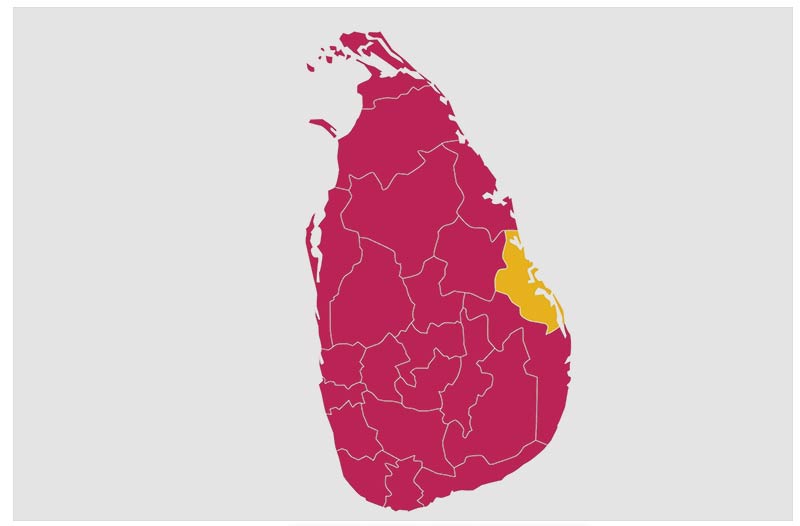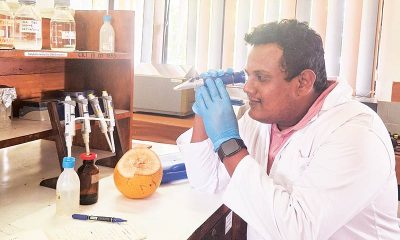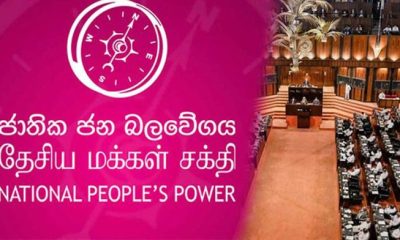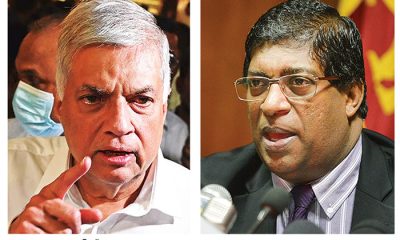Opinion
Pensioners given karapincha treatment

Dear Mr Editor,
It has been reported in the media that the Cabinet of Ministers has approved a salary increase within a range of between 24 to 50 per cent to the 1.15 million public servants, to be doled out in the not-too-distant future but perhaps after the Presidential polls. They will also be paid a considerably enhanced cost-of-living allowance to tide them over the present situation from now on and pronto at that. It is an open secret that these have been engineered in these election times for a very definite purpose. This sudden flow of the milk of human kindness, overflowing with empathy and sympathy, has a most notable ulterior motive; baits and carrots galore to get as many votes as possible. All of this is amidst mind-boggling somersaulting, pole-vaulting, and long-jumping, by some whose abdominal circumference could give a real run even to their heights.
Yet for all that, in such a scenario, there is not even a vague mention of the dire situation faced by the 700,000 or so government pensioners. There is not even some semblance of relief to this eternally suffering elderly mass of humanity at present. They have served our Motherland for the better part of their lives and are paid a meagre pittance as the monthly pension. Now, they have been given the throwaway ‘karapincha’ treatment. Even their savings invested in Fixed Deposits in the banks bring in an interest which has been truncated by half or more over the last couple of years. They are indirectly taxed at every turn and their life-savings invested in banks are being directly taxed as well. It seems to be, at least to the politicians, and to all intents and purposes, they have outlived their usefulness as far as the powers that be are concerned. They are all over 60, some into their seventies and eighties, with a few going on to their nineties. Many do not have living spouses and their children are quite a bit away from them, either in Sri Lanka or abroad. Many of these elderly people have major medical problems that need pretty expensive treatments. Most of these pensioners are biding their time and are mostly in the departure lounge of planet Earth. From the point of view of the politicians, they do not seem to matter as voters. The politicians do not seem to care one bit about them.
But I have some news for the Top Man and the current politicians in power. These chanda gundus are not going to take them anywhere. The current lot of public servants will take their enhanced remunerations and then go laughing all the way, to vote for someone else. They will have no qualms about voting for the Dasa or the Sahodaraya after collecting the dole-outs from the current lot of lawmakers. Even the estate workers, who have been given a considerable wage increase as a gundu recently, will gang up together and vote for someone else.
There is also the matter of the company that some of these presidential contenders keep. The integrity of the aspirants is likely to be judged by such company they keep. Whatever is said and done, the Government Pensioners have been in the public sector for many a year. Many of them have an undeterred love for our Motherland. They can easily distinguish the grain from the chaff. Over the last couple of weeks, at least two of the presidential contenders have taken into their bosom some infamous characters. They are some notorious crooks, swindlers, bribe-takers, and people with chequered pasts. Believe me., that will not go down well with our elderly pensioners. In one camp at least, one of the very senior lady members decamped, citing undesirables crawling out of the woodwork to tag along with the presidential aspirant of that party. The lady has been a much-respected high flyer in the political scenario. She has shown honesty, morality, courage and determination. She can be dead sure of most of the votes from the pensioners of her area when the time comes for a general election. In her area, there must be at least 50,000 pensioners. They will swing her high and plant her most comfortably into a Parliamentary seat.
So be warned, you lot of politicians who think you know anything and everything. These pensioners will keep these things in mind when they go to the polling stations on the 21st of September 2024 and also at the General Election that will invariably follow, just as day follows night, within a few months after that. They might even think of using their ballot and the franchise to teach the lot some lessons that they will not forget in a hurry. His writer hopes, perhaps against all hope, that this bit of writing will catch even a fleeting glance from the powers-that-be.
Disgruntled government pensioner
Opinion
Significance of Tamil vote in 2024 general election

Apart from the resounding victory by the NPP, the most significant election outcome is the remarkable change in the voting pattern of the Tamils in the North, the East, and the Central province not to mention Colombo that brought defeat to most of the Tamil political stalwarts like Sithatharan, Sumanthiran, Palani Thigambaram, Mano Ganeshan et al. This is the first time that such a change has happened in a general election where usually the ethnic political parties hold sway over minority votes. It is of vital importance for everybody including Tamil politicians, the present government, international community, hegemonic powers, ultra-nationalists and separatists to understand and correctly interpret this change in the Tamil political fabric.
The decisive factor that was apparent in the pre-election period was the need for a change which manifested in a weaker form at the presidential election that brought in a new president with 42% of the national vote with the majority of Tamils voting against the NPP candidate. In less than two months the whole picture had changed and a majority of Tamils who did not vote for the NPP at the presidential election took the unprecedented step of going against their own ethnic parties and voted for the NPP. Although it appears to be a sudden change of attitude obviously such changes on such a wide scale cannot happen overnight. The need for a system change must have been slowly and steadily growing in the minds of Tamils over a period of time, like it had in the Sinhalese. The latter was obviously weary of suffering under the governments of the two major political parties since independence. The former however had hitherto been loyal to their ethnic parties who pursued divisive communal politics appealing to the ultra-nationalist sentiments of the Tamils. What was the reason for the Tamils to change in this manner?
Presidential election may have shown the Tamils that the Sinhalese had decided to bring about a radical change. This would have been the cue for them to come out into the open and demonstrate the change that has been slowly taking place in their minds. The change that appeared to have taken place in less than two months was probably catalyzed in this manner.
Tamils suffered during the thirty-year war. It is probable that the new generation of Tamils have realised the futility of war and confrontation and decided to chart a different course and deviate from the main sociopolitical stream from the time of independence though there were times of convergence and cooperation albeit of short duration. Independence and universal franchise have driven a wedge between Sinhala and Tamil leaders which was rather unfortunate for they were together in the struggle for Independence. Tamil politicians enjoyed parity of political power and suddenly they realized that their privileged position was in danger due to universal franchise which would make them a minority in the parliament. They could not reconcile with the fact that they were representatives of a minority community. What is most unfortunate is that they could not see the opportunities that were there for them to play a vital role in the development of the whole country. The mistake the Tamil leaders committed at that time was to abandon the opportunity that was available to jointly participate in the central government and contribute to the development of not only the Tamils but also the whole country and instead choose the narrow parochial path of communal politics. This blunder has continued to plague the country and even caused the birth of terrorism and a bloody war.
These historical mistakes must have dawned on the new generation of Tamils who, like the Sinhalese want a change in their lives which could come with economic development rather than ultra-nationalist dogma. Further they may have realized the fact that Tamil ultra-nationalism was flawed, unjust, parochial and does not belong in the modern world. Communal barriers have to be breached to achieve connectivity, interaction and networking which are capable of opening new vistas in the modern electronic era. All communities who have made Sri Lanka their home must unite and develop their country. The absence of this unity may have been one of the reasons for the country to lag behind in economic development and finally end up being bankrupt which would have affected all communities alike. In this regard the Tamils have taken the first step and it is now up to the other communities to suitably respond.
The government must know that the Tamils have significantly contributed to their massive victory. The government must understand what these Tamils who have rejected their own political parties and leaders want. They, too, like the Sinhalese are affected by economic mismanagement and poverty. Their problems are same as those of the Sinhalese majority. All communities are in the same boat. Tamils have realised this truth and would want urgent attention to their immediate needs. Their nutrition, health and education should receive immediate and sufficient attention. Tamils have abandoned their own parties and embraced the governing party expecting urgent redress to their burning problems.
There is a lesson for the international community as well, especially for the imperialist western powers. The latter had made use of the lack of unity among the communities to destabilise the country in pursuance of their geo-political ambitions in the Indian Ocean region. The LTTE was a tool in their hands, and after the demise of its leader, other separatists moved in to fill the vacuum. The western powers must realise the futility of such policies in view of the radical changes taking place within the mind-set of the Tamils. Tamils may no longer see the Sinhalese as their oppressors and the Sinhalese may not harbour the fear that Tamils are demanding a separate country.
It is hoped that the time may come when the Tamils realise that the whole country belongs to all communities and it is their duty to participate in the development of the whole and not just the North and parts of the East. True Tamil national leaders may emerge who would want to share power at the centre rather than at the periphery and contribute to the governing of the whole country. It is hoped that this is the end of divisive communal politics and the beginning of a new era of unity and prosperity.
N. A. de S. Amaratunga
Opinion
Revolutionary elections

By Dr Upul Wijayawardhana
No doubt, it is the ‘election like no other’ in the ‘country like no other’ that would top the league of revolutionary elections, of which there were three, just this month. Much has been written about two; the one in Sri Lanka and the second in the US but the third, in the UK, had hardly any mention in Sri Lankan media, perhaps, because it was not a general election but the election of the leader of a major political party, which I would come to later.
The NPP/JVP deserves to be congratulated on its unprecedented, massive victory and it is hoped that the new government will succeed. All ‘communal’ parties, save a few, faced humiliating defeats. The NPP won 21 out of 22 districts, the only exception being Batticaloa. Its win in Jaffna sends a clear message to the communal parties, whose leaders have been taking the people of the North for a ride to further their own interests. Do hope the new government makes good use of this golden opportunity to bring about reconciliation.
It is not only the results in the North that gives hope but also from the South. It was gratifying for me to note that my home district Matara, which is predominantly Sinhala, has elected a Tamil MP as well as a Muslim MP. Not only that, out of the 6 NPP MPs elected, the Tamil MP got the second highest and the Muslim MP got the fourth highest preferential votes. A district once well known to elect on the basis of caste and creed, a concept encouraged if not engineered by the Communist Party, has gone a full circle, thanks to another Marxist party! Perhaps, this demonstrates that voters are no longer misled by man-made differences and are achieving a degree of political maturity, which bodes well for the future. Yet another ray of hope for true reconciliation!
As far as the US election is concerned, even the bitterest critic of Donald Trump has to concede that he achieved the impossible, not once but twice. On both occasions, it was not that Trump was selected by the Republican Party but he got the party to rally round him. In fact, Trump started life as a Democrat and was not a professional politician. He achieved fame as a sharp businessman and a TV personality and decided to be president. One man’s ambition succeeding is unprecedented in US history, as far as I am aware. Though Trump won the 2016 election on the collegiate vote, he was almost 300,000 behind Hilary Clinton in the popular vote. In the 2020 election which he lost to Biden, he polled 74,223,975 whereas Biden polled 81,283,501. In the 2024 election though his popular vote increased to only 76,768,490 votes (according to the last count, as counting in US elections is very prolonged), he had a landslide winning 312 collegiate votes. Kamala Harris polled only 74,194,538, staggering 7 million less than Biden. Do these results give credence to Trump’s accusations of vote rigging in the 2020 election, I do not know. When he was portrayed as a bitter loser, no one ever imagined that Trump would have a comeback. Multitude of court cases he faced made the prospect even dimmer. His dramatic win, perhaps, adds weight to his claim that some of these cases were politically motivated.
The other important aspect of the US presidential election is that all polling organisations got their predictions totally wrong. Up to the last moment, it was too close to call they said, but as the counts proceeded, it was obvious that Trump has achieved the impossible again. However, the most important lesson for the rest of the world is that the US voting system is nothing worth emulating!
Whilst the USA is still waiting for the ‘glass ceiling’ to be broken, the UK has had three female prime ministers and recently elected another lady as the leader of a major political party. Interestingly, it is the Conservative party that seems to be progressive, the Labour Party still waiting to elect a female leader, in spite of two having acted as leader!
Kemi Badenoch, who was elected as the leader by the members of the Conservative Party early this month, is the Leader of the Opposition and may well be next Prime Minister, if the Labour government continues to mess up, as it is doing now. She may well follow Margaret Thatcher, Theresa May and, of course, the disastrous Liz Truss.
Kemi Badenoch’s election is revolutionary in two more aspects. She is the first Black leader. male or female, of a major UK political party. Further, she is the first immigrant to be a leader of a major political party. Though the US constitution stipulates that only a person born in the US could hold the highest political position there is no such stipulation in the UK. If that was so, Boris Johnson would not have been PM, as he was born to British parents in New York, while his father was studying in Columbia University!
Kemi Badenoch’s family is from Nigeria, her father being a GP and her mother a professor of physiology. Theoretically, though she spent the first sixteen years of her life in Nigeria and USA where her mother lectured, she could be classed non-immigrant as her mother travelled to London from Lagos to have her in a private hospital in Wimbledon, to return shortly after the delivery of the baby. In fact, in her first speech in parliament Badenoch declared that “to all intents and purposes, I am a first-generation immigrant”. Whatever it may be, hats-off to the UK for achieving this degree of political maturity, which is hoped we would be able to emulate ultimately.
What a revolution would it be, if a Black immigrant lady became the Prime Minister of the UK!
Opinion
Key to resilient plantation agriculture in Sri Lanka

Sustainable soil health:
by Lalin I De Silva
With the escalating impacts of climate change, Sri Lanka’s plantation sector—spanning tea, rubber, coconut, spices, and oil palm—faces critical challenges in maintaining soil health. As fluctuating weather patterns affect nutrient availability and increase erosion, achieving sustainable crop productivity requires rethinking soil management. This article explores why a shift to adaptive soil practices is essential, discussing the role of nutrient management, organic matter enhancement, and precision techniques that can support a climate-resilient future for Sri Lankan planters.
Understanding Soil Health and Climate Adaptation
In Sri Lanka, where agriculture is deeply interwoven with economic stability and cultural heritage, soil is a foundational asset. Healthy soil not only sustains high yields but also contributes to carbon sequestration and water retention. However, climate change introduces frequent rainfall variability, which accelerates nutrient leaching, affects soil structure, and increases erosion risk—especially in sloped plantation areas common in tea production. Understanding the specific nutrient needs of each crop and adapting soil practices accordingly can help mitigate these adverse impacts.
Key Soil Nutrients and Their Importance
The macronutrients nitrogen (N), phosphorus (P), and potassium (K) play vital roles in crop health, but their optimal levels vary between plantation crops:
Nitrogen (N): Essential for foliage growth, nitrogen requirements are particularly high for tea, which thrives with approximately 20-25 mg/kg. For other crops like coconut and oil palm, nitrogen supports broader canopy development, which is important for resilience against drought.
Phosphorus (P): Phosphorus supports root development, critical in early plant growth and essential for strong, resilient crops. A good level for most plantation soils falls between 10-30 mg/kg, depending on soil type and crop. Coconut, which requires strong roots for water absorption, greatly benefits from adequate phosphorus levels.
Potassium (K): Often called the “quality nutrient,” potassium improves crop resilience and quality. For example, tea thrives with potassium levels of 120-150 mg/kg, while rubber and coconut need slightly higher levels to promote nutrient distribution across the plant structure, supporting resilience during dry spells.
Tailoring Soil Practices for Plantation Resilience
Plantations must adopt region-specific soil management practices to meet crop needs while minimizing environmental impact. Here are some effective techniques for sustainable soil management:
Cover Crops and Erosion Control: By planting cover crops like legumes, farmers can reduce erosion while adding nitrogen to the soil naturally. Cover crops shield soil from heavy rain, reducing topsoil loss and adding organic matter as they decompose, which improves nutrient availability and soil structure over time.
Organic Matter Management: Increasing organic matter in the soil improves moisture retention and overall fertility. Applying compost, mulches, or green manure boosts organic carbon levels, which is particularly beneficial in tropical climates with high decomposition rates. Mulching, for instance, helps regulate soil temperature, retain moisture, and add essential nutrients as it decomposes.
Biochar Application: Biochar, a type of charcoal added to the soil, improves water retention, nutrient availability, and microbial health. In tea estates or high-rainfall areas, biochar acts as a stabilizer, helping the soil retain nutrients that might otherwise be washed away. Its porous structure holds onto moisture, benefiting root health during dry periods.
Precision Fertilisation
Implementing a targeted fertilisation approach ensures the soil receives just the nutrients it needs. Slow-release fertilisers and digital soil sensors reduce nutrient leaching, prevent over-application, and support a balanced nutrient profile. For example, the use of a portable spectrophotometer can measure soil nutrient levels, guiding adjustments that enhance productivity and reduce waste.
Carbon Sequestration Techniques: Practices like agroforestry and low-tillage farming promote carbon storage in the soil, contributing to climate resilience and soil fertility. By integrating trees with crops, agroforestry not only sequesters carbon but also protects against soil erosion and provides shade, which reduces crop stress during high temperatures.
Implementing Soil Testing and Monitoring
For Sri Lankan planters, regular soil testing and monitoring are essential to maintain optimal soil health. Digital tools such as portable pH meters, EC (Electrical Conductivity) meters, and NPK soil test kits provide valuable data on soil composition and health. By regularly testing for pH, organic carbon, and nutrient levels, planters can make informed decisions on crop nutrition and soil amendments. Mapping plantation areas using handheld GPS devices also aids in precision agriculture, allowing farmers to apply fertilizers and water only where necessary, minimizing environmental impact.
Promoting Soil Biodiversity and Microbial Health
Healthy soils host a diverse range of micro organisms, essential for nutrient cycling and disease suppression. Adopting organic inputs and minimising chemical usage help sustain beneficial bacteria, fungi, and earthworms, all of which improve soil structure and fertility. Mycorrhizal fungi, for instance, form symbiotic relationships with plant roots, enhancing phosphorus uptake and strengthening plants against drought stress. Encouraging these organisms through organic farming practices is a vital component of sustainable soil health.
Way Forward: Embracing a Soil-Centric Approach in Sri Lanka
Sri Lankan planters face unique challenges from climate change, but by adopting a soil-centric approach, they can maintain crop yields and enhance environmental resilience. Partnerships with agronomists and value chain consultants can assist in identifying effective practices suited to local soil types and climate conditions. Additionally, government support for sustainable farming incentives and education initiatives would empower farmers to adopt these practices.
Implementing soil-friendly practices at scale requires both knowledge-sharing and community cooperation. Initiatives like training programes in precision agriculture, digital tools for soil monitoring, and organic fertiliser subsidies could be valuable. By aligning these practices with Sri Lanka’s climate resilience goals, the plantation sector can enhance productivity sustainably.
Maintaining healthy soils is not only a matter of crop productivity; it is a defence strategy against the unpredictable impacts of climate change. Through sustainable soil management practices—such as increasing organic matter, precise nutrient application, and encouraging soil biodiversity—Sri Lanka’s planters can create resilient agricultural systems that support long-term economic stability. Embracing these practices will enable the plantation sector to flourish sustainably, preserving the environment while continuing to contribute to the nation’s economy. With a soil-centric approach, the future of Sri Lankan agriculture holds promise for both productivity and resilience in the face of climate change.
Lalin I De Silva is a value chain journalist of www.vivonta.lk, Senior Planter, Agricultural Advisor / Consultant, Secretary General of Ceylon Planters Society, Editor of Ceylon Planters Society Bulletin and freelance journalist.
-

 Life style5 days ago
Life style5 days agoKing of coconuts heads for a golden future
-

 Latest News7 days ago
Latest News7 days agoColombo district preferential votes announced
-

 News4 days ago
News4 days agoNPP appoints two defeated candidates as NL MPs
-

 News6 days ago
News6 days agoPresident warns his party: “We will fail if we view power as an entitlement to do as we please”
-

 News3 days ago
News3 days ago‘Gas Cylinder’ explodes; Ranil flays NDF Secy. for submitting Ravi’s name
-

 Latest News7 days ago
Latest News7 days agoGampaha district: NPP 16, SJB 3
-

 Midweek Review2 days ago
Midweek Review2 days ago‘Ramayanizing’ Sri Lanka by Courtesy of SriLankan Airlines
-

 Sports3 days ago
Sports3 days agoMaking batting compulsory for bowlers has worked – Theekshana











